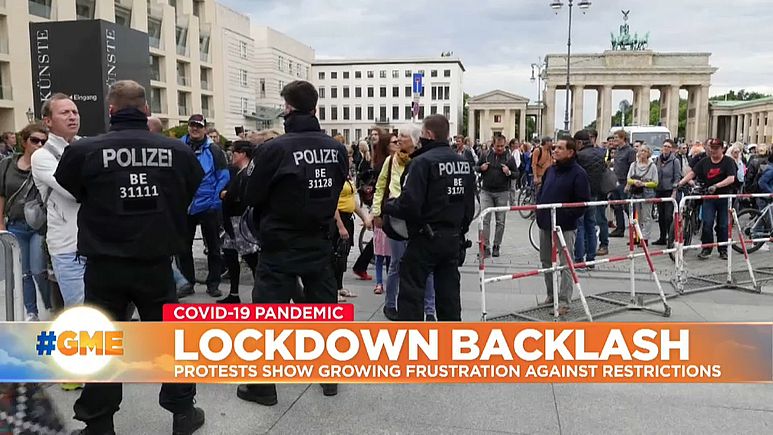Protests in Berlin over government's lockdown response
euronews_icons_loading

Berlin saw new protests against the country's coronavirus lockdown over the weekend.
As well as protests in the capital, crowds also gathered in Munich and Stuttgart to demonstrate the German government's response to the COVID-19 outbreak.
They claim that restrictions on civil liberties during the lockdown, which has been notably less strict in Germany than elsewhere in Europe, are undemocratic.
Germany's death tolls remain under 8,000, one of the lowest in western Europe, while schools, shops, places of worship, and museums have all reopened.
In some cases, demonstrations have been started by left-wing groups or anti-vaccine campaigners, but what unites them is a lack of trust in the authorities, experts say.
- Coronavirus: Spaniards take to the terraces as lockdown eases
- German theatre company performs in a car park due to coronavirus restrictions
- Crowds flock to Portugal's beaches as government eases coronavirus restrictions
Professor Swen Hutter, an expert on conflict and political movements, said the collection of people attending the protest was unusually varied.
“It is a very big mix of people. That happens sometimes to movements that are related to one specific event. Because we have this specific corona pandemic and the restrictions relating to it, you can get a lot of very different people joining up behind it.”
The demonstrations have spread across Germany and have also started to appear in other European countries. In some cases, right-wing groups have tried to capitalize on the protests.
In the United Kingdom, 19 people were arrested for breaking social distancing rules while attending an anti-lockdown rally at the weekend.
Meanwhile, police in the Polish capital Warsaw used tear gas on protesters who were demanding the government allow businesses to reopen following the lockdown.